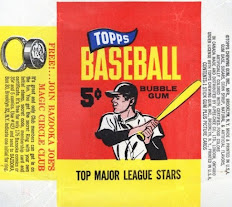Saturday, January 9, 2021
1965 Was a Very Good Year
Sunday, October 11, 2020
Final Card - Ed Rakow
I posted Ed Rakow's 1963 card on another blog some years ago, but that was before I acquired his final card in the 1965 set (#454).
Rakow had a relatively short career. The record shows he pitched from 1960 to 1967, but he missed 1966 altogether, and his appearances in ’60, ’65, and ’67 numbered 9, 6, and 17, so the bulk of his career was from 1961-63 with the Kansas City Athletics and 1964 with the Tigers. Those were also the 4 years he managed to stay out of the minor leagues.
Ed was signed by the Brooklyn Dodgers in 1957, and made his major-league debut with Los Angeles in 1960. He pitched 9 games in his first season – 7 in the first 2 months, then 2 more during his September recall.
During spring training in 1961 he was traded to the Athletics for pitcher Howie Reed. Ed was primarily a reliever in 1961, but also made 11 starts.
He was the team’s ace in 1962, leading in starts (35), innings (235), and complete games (11). (By the way, the other starters were Dan Pfister, Jerry Walker, and Orlando Pena - a far cry from Jim Hunter, Lew Krausse, Johnny Odom, Jim Nash, and Chuck Dobson, who manned the rotation in just a few years.)
In 1962 Ed was joined in the rotation by Dave Wickersham, rookie Diego Segui, and Moe Drabowsky, who joined the team in mid-season. Rakow led the league in earned runs allowed (111) and also losses (17), which I imagine wasn’t hard to do for the early-1960s’ Athletics. He still managed to win a career-high 14 games.
In 1963 he slumped to a 9-10 record. After the season he was traded to the Tigers along with Wickersham and 2nd baseman Jerry Lumpe for outfielder Rocky Colavito and long-time Cubs’ pitcher Bob Anderson.
He made 13 starts for the Tigers, but spent most of 1964 in the bullpen. Rakow made 6 relief appearances during the first half of May 1965, but was soon sent down to the minors, not to return to the majors until 1967.
The Tigers released him in May 1966, then he was signed by the Red Sox but spent all of 1966 in the minors. In December he and pitcher Julio Navarro were traded to the Braves for catcher Chris Cannizzaro and outfielder John Herrnstein.
Ed’s final major-league action was 17 games with the Braves over the second half of 1967. He played for the Braves’ AAA team in early 1967, and all of 1968 before retiring.
Rakow passed away in 2000 at age 65.
Saturday, March 21, 2020
Final Card - Barney Schultz
Barney Schultz pitched for 7 seasons between 1955 and 1965, mostly for the Cardinals and Cubs. All of his 227 games were as a reliever.
Schultz was signed by the Phillies way back in 1944. His first 2 pro seasons were with the Wilmington Blue Rocks, the Phillies' class-B team. (In 1948, that team would also include Robin Roberts.)
Between 1947 and 1953 he bounced around the farm systems of the Tigers, Cubs, Braves, and Pirates.
Barney was traded to the Cardinals before the 1954 season, and after another full season in the minors he made his major-league debut in April 1955, eleven seasons into his career. He appeared in 19 games, but by mid-June (with an ERA of 7.89) he was sent back to the minors to finish the season.
Schultz spent the next 3 seasons in the minors for the Cardinals and (following a May 1958 trade) the Tigers. Detroit called him up for 13 games in mid-summer 1959, but then it was back to the bushes.
Barney was dealt to the Cubs in April 1960, and in mid-June 1961 he returned to the majors for the next 5 years (although spending parts of '64 and '65 in the minors). He pitched in 41, 51, 39, 30, and 34 games from 1961-65. In his June 1961 return, he pitched in both ends of a doubleheader on his first day back.
In June 1963 he was traded back to the Cardinals for Leo Burke. He also pitched in 4 games in the 1964 World Series against the Yankees.
Schultz pitched for the Cardinals’ AAA team in Tulsa in 1966, before retiring.
After his playing career he was a pitching coach for the Cardinals and Cubs.
He passed away on 9/6/2015, 50 years to the day after his final game.
Tuesday, December 31, 2019
Final Card - Harvey Haddix
Haddix was signed by the Cardinals in 1947. After 4 seasons in the minors and one in the military, he made his debut for the Redbirds in August 1952.
Haddix posted a 20-9 record in 1953, led the league with 6 shutouts, and finished 2nd in the NL Rookie of the Year voting. He also made his first of three consecutive All-Star teams.
He won 18 and 12 games in '54 and '55.
During the 1956 season he was traded to the Phillies. After the 1957 season the Phillies traded him to the Reds for outfielder Wally Post.
Haddix only pitched one season for the Reds. In January 1959 he was traded to the Pirates (along with Smoky Burgess and Don Hoak) for 4 players.
Harvey pitched 5 seasons for Pittsburgh, including their World Championship in 1960. He was 2-0 in the '60 World Series, starting game 5 and relieving in game 7. He won the Gold Glove award from 1958-60.
After the 1962 season he moved to the bullpen, appearing in 49 games both in 1963 and (following his trade to the Orioles) 1964.
Haddix' workload was drastically reduced in his final (1965) season, pitching in only 24 games. In late August he was sold to the Braves, but returned to the Orioles three days later, having not pitched for Milwaukee.
The Orioles released him in January 1966, ending his 14-year career.
After his playing career he was a coach for the Mets, Reds, Red Sox, Indians, and Pirates.
He passed away in 1994 at age 68.
Tuesday, September 24, 2019
Final Card - Harry Bright
Harry Bright (#584) was just one of several all-purpose utility players clogging the Cubs' roster in the mid-1960s. (Meanwhile, other teams were collecting good pitchers and outfielders.)
Bright played for 8 teams from 1958 to 1965. Most of his playing time came in 1961-62 with the Washington Senators. (In '62, he was their regular 1st baseman.)
Harry was signed by the Yankees back in 1946, and except for the 1961-63 period with the Senators and Yankees, he played in the minors every season from 1946 to 1971.
He spent time with the Pirates (1958-60), Senators (1961-62), Reds (1963), Yankees (1963-64), and Cubs (1965). In his final season he appeared in 27 games, all as a pinch-hitter.
Bright passed away in 2000 at age 70.
































